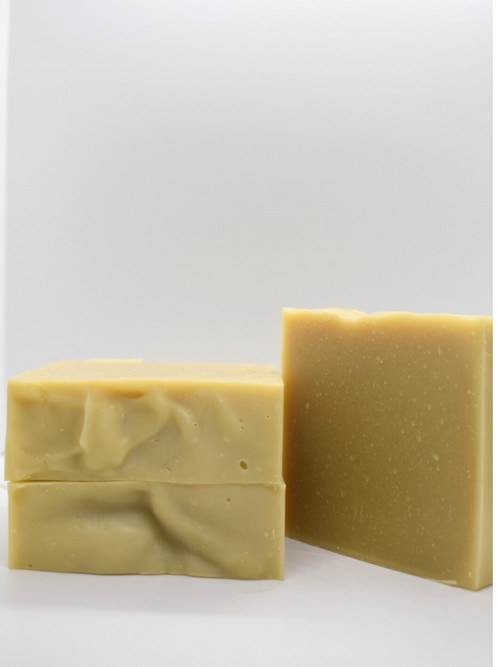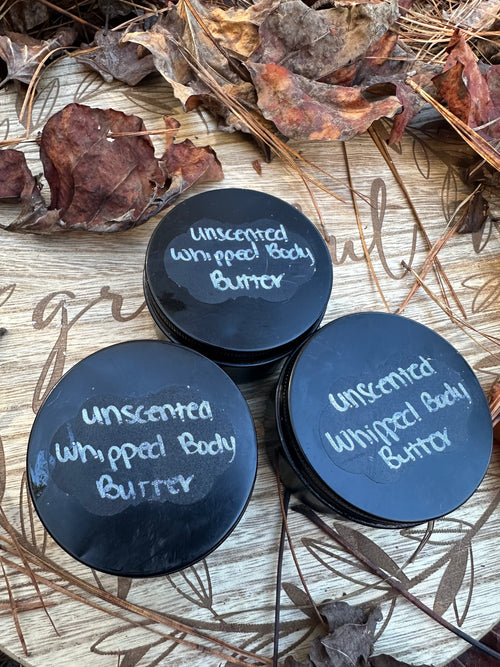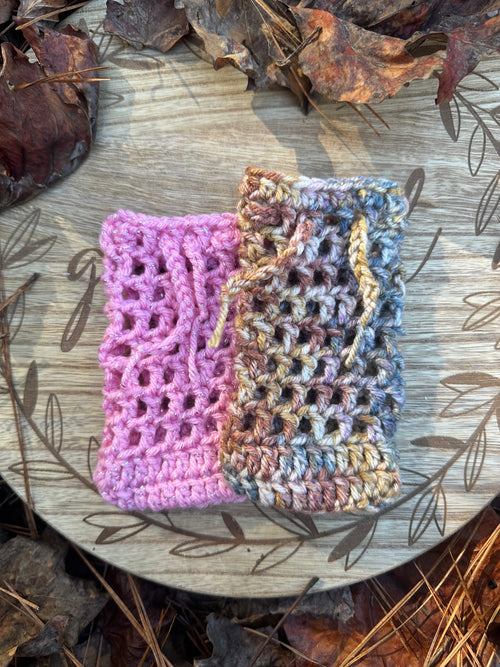Picture a warm bath in ancient Rome, where wealthy citizens would bathe with sachets of ground oats to soothe their skin. This wasn't just a luxury - it was one of the earliest documented uses of oatmeal for skincare. Today, this time-tested ingredient has found new life in artisanal soap making, offering relief for modern skin concerns without harsh chemicals.
The Science Behind the Soothing
What makes a humble breakfast grain such a powerful skincare ingredient? Inside each oat kernel lies a complex array of compounds that benefit your skin:
Beta-glucans, naturally occurring polysaccharides, create a protective film on your skin that locks in moisture while still allowing it to breathe. These same compounds possess remarkable anti-inflammatory properties, calming irritated skin without synthetic additives.
Avenanthramides, unique to oats, are nature's anti-itch compound. These rare antioxidants specifically target skin inflammation and redness, providing relief that commercial anti-itch products attempt to replicate synthetically. Research shows these compounds can calm irritated skin within minutes of contact, working at a cellular level to reduce inflammation signals.
The protein content in oats also plays a crucial role. Unlike many natural ingredients that lose their protein structures during bar soap making, oat proteins remain stable through the process, helping to:
- Build a protective barrier on the skin
- Bind moisture to the skin's surface
- Support natural collagen production
- Enhance skin elasticity
Beyond Basic Cleansing
Traditional soap makers throughout history understood something modern science is just beginning to verify: oatmeal's cleansing abilities extend far beyond simple dirt removal. The saponins in oats create a gentle, natural lather that lifts away impurities while maintaining your skin's delicate moisture balance.
But perhaps most fascinating is oatmeal's ability to normalize skin pH. While conventional bar soaps often disrupt your skin's acid mantle (that protective barrier keeping moisture in and irritants out), oatmeal works as a natural buffer, helping maintain optimal pH levels.
This pH-balancing act is particularly crucial because:
- Most skin conditions worsen with pH imbalance
- Healthy skin maintains a pH between 4.7 and 5.75
- Traditional soaps can push skin pH above 7.0
- Oatmeal helps restore natural pH within hours of use
From Field to Bathroom: The Journey Matters
The transformation of oats into effective skincare isn't as simple as grinding up your morning porridge. The oats used in quality soap bars undergo a specific milling process that creates the perfect particle size for gentle exfoliation without causing micro-tears in the skin.
This process, known as colloidal milling, produces oat flour so fine it can:
- Distribute evenly throughout the soap
- Remain suspended in the bar
- Release benefits gradually during use
- Provide consistent exfoliation
Historical Wisdom, Modern Validation
Ancient civilizations worldwide recognized oatmeal's skin-soothing properties:
- Egyptian physicians prescribed oat baths for skin ailments
- Native American healers used oat poultices for skin inflammation
- Traditional Chinese Medicine incorporated oats in skin treatments
- European herbalists recommended oat-based remedies for eczema
Modern research has validated these traditional uses, revealing that oatmeal contains:
- Over 30 different phenolic compounds
- Multiple antioxidant compounds
- Natural UV-protective properties
- Skin-identical lipids that support barrier function
The Forgotten Art of Oat Processing
Traditional soap makers understood that the timing of oat harvesting affects its skincare properties. Oats harvested too early lack the full complement of beneficial compounds, while late-harvested oats may have reduced potency. Modern artisanal soap makers often work directly with farmers to ensure oats are harvested at peak potency for skincare use.
The processing temperature also plays a crucial role:
- Cold-processed oats retain more active enzymes
- Moderate heat activates certain beneficial compounds
- Excessive heat can destroy delicate proteins
- Proper processing preserves natural antioxidants
Understanding Oat Varieties in Skincare
Not all oats are created equal when it comes to skincare benefits. The variety matters significantly:
Avena Sativa (Common Oat)
The most widely used variety contains balanced levels of beneficial compounds but varies in potency based on growing conditions. While effective, it's considered the baseline for skincare benefits. Growing conditions significantly impact its therapeutic properties:
- Highland-grown oats show higher antioxidant levels
- Organic cultivation increases beneficial compound content
- Stress-induced growth conditions enhance protective compounds
- Soil mineral content affects final nutrient profile
Avena Nuda (Naked Oat)
This ancient variety contains up to 40% higher levels of avenanthramides compared to common oats. The absence of outer husks means more direct skin benefits, though it's rarer and more costly to produce. Research indicates:
- Enhanced anti-inflammatory response
- Superior moisture retention
- Better penetration of active compounds
- Improved skin barrier support
Wild Oat Extract
Derived from Avena Sterilis, this variety shows enhanced anti-inflammatory properties and is particularly effective for sensitive skin conditions. Traditional healers prized this variety for its potent soothing effects. Modern studies reveal:
- Higher concentration of beta-glucans
- Unique antioxidant profiles
- Enhanced wound-healing properties
- Superior itch-relief capabilities
The Colloidal Revolution
The term "colloidal oatmeal" appears frequently in skincare, but few understand its significance. This specialized form of oats undergoes a precise grinding process that creates particles small enough to:
- Form a protective colloid when mixed with water
- Penetrate the skin's upper layers
- Distribute active compounds effectively
- Create an even, protective film
The colloidal milling process requires:
- Initial hull removal without heat damage
- Precise particle size reduction (2-5 microns optimal)
- Controlled temperature processing
- Immediate stabilization to prevent oxidation
Clinical Applications
Recent dermatological research has expanded our understanding of oatmeal's benefits for specific conditions:
Eczema Management
Clinical trials show colloidal oatmeal:
- Reduces inflammation markers by up to 78%
- Decreases itching within 15 minutes
- Improves skin barrier function
- Reduces reliance on topical steroids
Psoriasis Support
Studies indicate benefits including:
- Reduced scaling and redness
- Improved moisture retention
- Enhanced skin cell turnover
- Decreased inflammation markers
Acne Treatment
Research reveals unexpected benefits:
- Natural oil absorption
- Bacterial balance support
- Inflammation reduction
- Gentle exfoliation properties
Synergistic Ingredients
While oatmeal alone offers remarkable benefits, certain companion ingredients enhance its effectiveness:
Honey
Ancient Egyptian physicians combined oats with honey for enhanced healing. Modern research shows this combination:
- Amplifies antimicrobial properties
- Increases moisture retention
- Enhances skin barrier repair
- Provides additional antioxidants
- Stabilizes active compounds
- Extends therapeutic benefits
Goat's Milk
Traditional European soap makers discovered that combining oats with goat's milk created a uniquely effective cleanser. The combination provides:
- Complementary pH-balancing effects
- Enhanced protein delivery
- Improved mineral content
- Better lather quality
- Natural alpha-hydroxy acids
- Enhanced nutrient absorption
Essential Minerals
Certain mineral combinations enhance oatmeal's effectiveness:
- Zinc for enhanced healing
- Magnesium for barrier support
- Copper for collagen production
- Selenium for antioxidant activity
Addressing Modern Skin Concerns
Today's environmental challenges make all natural oatmeal soap more relevant than ever:
Urban Pollution Defense
The antioxidants in oatmeal help combat free radical damage from:
- Air pollution
- UV radiation
- Environmental stress
- Industrial exposures
- Vehicle emissions
- Indoor air pollutants
Digital Age Skin Issues
Extended screen time and indoor living create new skin challenges that oatmeal soap can address:
- Blue light exposure protection
- Stress-related inflammation
- Indoor air pollution effects
- Decreased skin barrier function
- Artificial light damage
- Climate-controlled environment impact
Research-Backed Benefits
Recent scientific studies have uncovered new benefits:
Microbiome Support
Oatmeal helps maintain healthy skin flora by:
- Supporting beneficial bacteria
- Reducing harmful microorganisms
- Maintaining optimal pH
- Providing prebiotic compounds
Barrier Function Enhancement
Clinical measurements show:
- 50% improvement in barrier function
- Reduced trans-epidermal water loss
- Enhanced ceramide production
- Improved lipid organization
Making an Informed Choice
When selecting oatmeal bar soaps, consider these
Look for signs of quality processing:
- Even color distribution
- Visible oat particles
- Smooth, firm texture
- Natural oat aroma
- Clean ingredient list
- Proper certification
Usage Guidelines
For optimal results:
- Begin with room temperature water
- Allow lather to remain on skin briefly
- Rinse thoroughly but gently
- Pat dry without rubbing
- Monitor skin response
- Adjust frequency as needed
The remarkable journey of oatmeal from ancient remedy to clinically-validated skincare ingredient demonstrates its enduring value. Whether addressing specific skin conditions or seeking general skin health improvement, this time-tested ingredient continues to prove its worth through scientific validation and real-world results.


